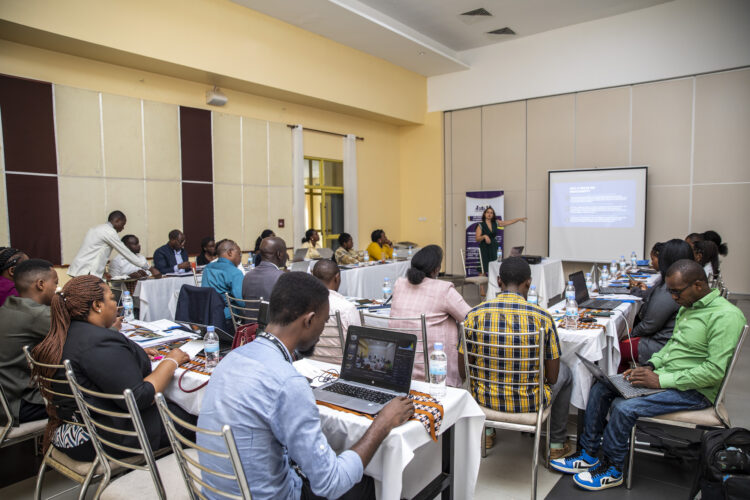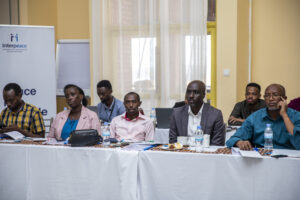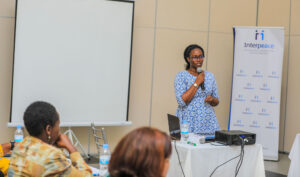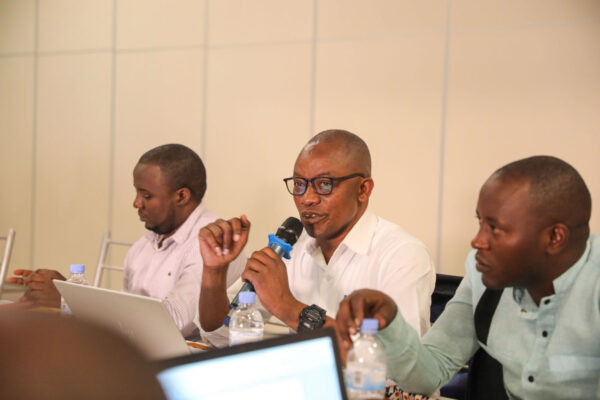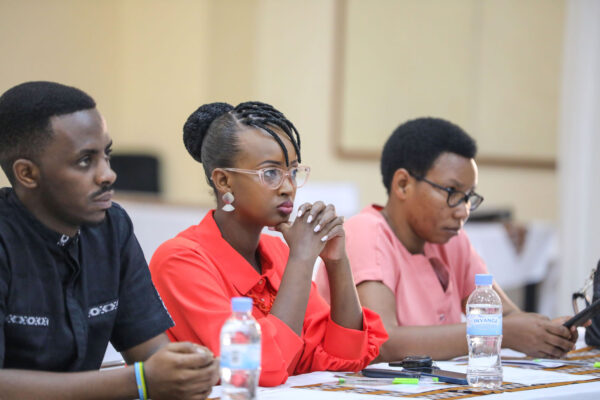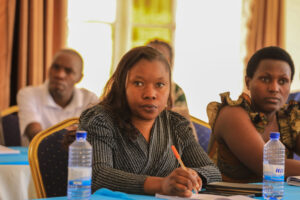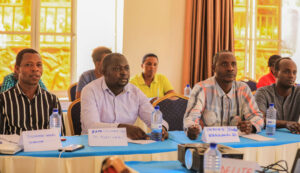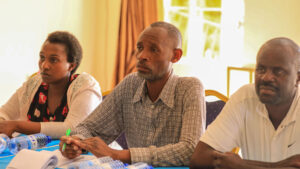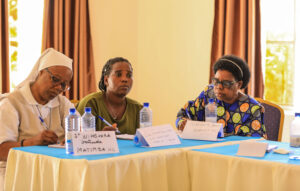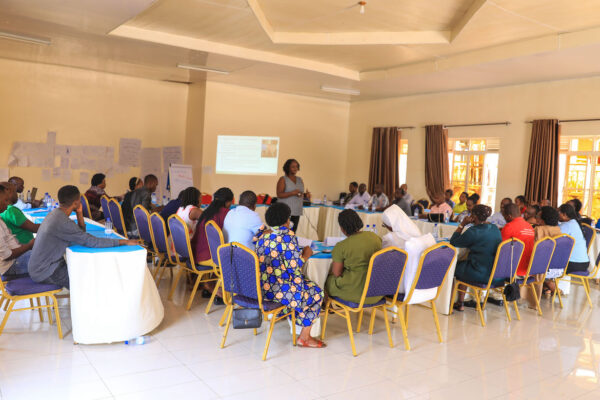De mauvaises compétences parentales, le manque de communication entre les membres de la famille et les normes de genre négatives affectent la cohésion familiale et la cohésion communautaire. L'enquête de référence menée par Interpeace en 2021 pour éclairer son programme holistique de consolidation de la paix sur quatre ans au Rwanda a révélé qu'ils contribuent en outre à exacerber les conflits familiaux et la violence basée sur le genre (VBG), divisant ainsi les familles.
L'étude a identifié quatre principales formes de VBG, physique, économique, sexuelle et psychologique, subies à la fois par les femmes/filles et les hommes/garçons dans cinq districts, qui provoquent un dysfonctionnement familial et augmentent l'abus d'alcool ou de drogues et la délinquance chez les jeunes adultes. Ces violences affectent également le développement socio-économique des familles et des communautés.
Interpeace et ses partenaires, en collaboration avec le Rwanda Men's Resource Centre (RWAMREC), ont établi un programme qui promeut la masculinité positive et les normes et pratiques parentales positives, ciblant les couples, les adolescents plus âgés et les détenus comme contribution aux efforts existants. Plus spécifiquement, le programme s'adresse aux parents, aux enfants âgés de 12 à 24 ans, aux couples mariés et aux détenus en voie de libération.
Le programme propose une approche transformatrice en matière de genre dans laquelle la population cible est encouragée à réfléchir de manière critique aux normes et stéréotypes de genre négatifs pour les remettre en question et adopter des comportements plus équitables entre les sexes au sein des familles et des communautés.
L’enquête de 2021 a souligné que les formes de VBG les plus couramment identifiées sont 10 % plus fréquentes chez les femmes que chez les hommes. Le programme incitera les hommes et les garçons, aux côtés des femmes et des filles, à remettre en question les notions rigides et négatives de la masculinité et les pratiques parentales négatives et à adopter des pratiques positives, stimulantes, empathiques, équitables et bienveillantes.
S’il est mis en œuvre avec succès, il devrait contribuer à réduire la violence sexuelle et sexiste, les conflits domestiques et la délinquance juvénile, de même qu’à favoriser la communication familiale et l’égalité des sexes dans les familles et les communautés.
« Nous avons décidé de travailler sur les masculinités en engageant les garçons et les filles à comprendre leurs vulnérabilités et leur résilience dans une perspective de genre et à s'attaquer aux facteurs sexospécifiques des conflits familiaux, à renforcer la résilience de genre et à promouvoir l'autonomisation des femmes. Nous espérons que ce programme améliorera les connaissances, les attitudes et les pratiques en matière d'égalité des sexes, de masculinité positive et de parentalité », a noté le représentant national d'Interpeace, Frank Kayitare, dans son discours de bienvenue lors de l'atelier de validation du programme le 5 octobre 2023 à Kigali.

Le programme de quatre modules complétera d'autres outils et politiques existants sur l'égalité des sexes et la famille. Il est aligné sur la Politique nationale contre la violence basée sur le genre ainsi que sur la Politique nationale genre révisée de 2021, en particulier son domaine prioritaire quatre, qui cherche à tirer parti des normes culturelles positives qui soutiennent les meilleures pratiques pour l'égalité des sexes, ainsi que le domaine prioritaire cinq pour impliquer les hommes et les garçons dans la promotion du genre. L'invitée d'honneur de l'événement de validation des cursus, Aline Umutoni, directrice générale chargée de la promotion de la famille et de la protection de l'enfance au ministère du genre et de la Promotion de la famille (MIGEPROF), a salué cette initiative. « Ce programme est unique car il cible des groupes critiques de personnes. Il contribue à construire une société rwandaise libérée de la violence et des conflits », a-t-elle souligné.
Il sera mis en œuvre par divers acteurs, notamment les structures gouvernementales et les organisations de la société civile (OSC), du niveau national au niveau local. Au total, 27 personnes de ces institutions ont déjà été encadrées pour en former d'autres pour une diffusion rapide et large du cursus.
Structure du programme
Ce programme de prévention est constitué de quatre modules. Le premier d’entre eux cible les couples avec pour objectif principal d’améliorer les relations équitables entre les sexes entre les époux et de prévenir ou d’atténuer la violence domestique, tandis que le second porte sur les couples en tant que parents pour les encourager à adopter une parentalité positive et équitable entre les sexes et à réduire les sanctions sévères envers les enfants.
Le troisième module est prévu pour les détenus de sexe masculin adultes dans les prisons pour les sensibiliser aux pratiques de masculinité positives afin de réduire le risque de commettre des crimes liés à la VBG une fois qu'ils auront réintégré leur famille et leur communauté après leur libération. Le quatrième module est lié aux jeunes âgés de 12 à 24 ans, dans les écoles, au sein des communautés et dans les centres de réadaptation pour promouvoir une masculinité positive et des relations saines et prévenir ces violences chez les jeunes.
Chaque module est destiné à être dispensé en groupe, ciblant des groupes de 24 personnes. Il sera animé par deux volontaires communautaires bien formés (femme et homme). Il facilitera la tenue de séances d'éducation une fois par semaine pendant six semaines consécutives.
Ce programme a été élaboré en partenariat avec le Centre de ressources pour les hommes du Rwanda (RWAMREC), une ONG qui milite en faveur de l'égalité des sexes, de la masculinité positive et de l'engagement des hommes dans l'élimination de la violence sexiste. Sa mise en œuvre viendra compléter d'autres interventions d'Interpeace, telles que la thérapie de guérison multifamiliale, une intervention psychologique communautaire qui aborde les conflits intra et extrafamiliaux et renforce la communication et la cohésion familiales dans des espaces sûrs.

